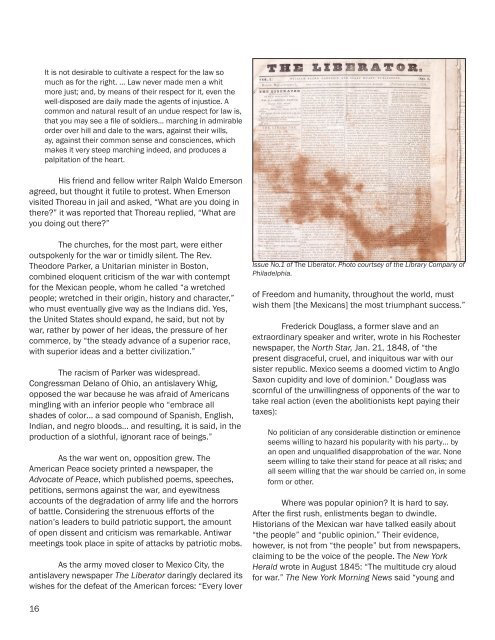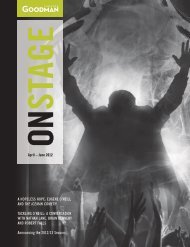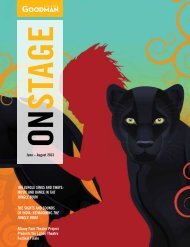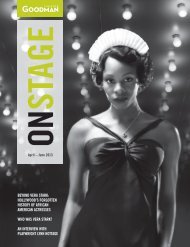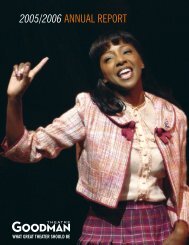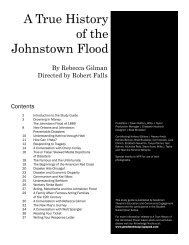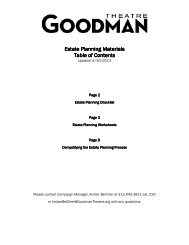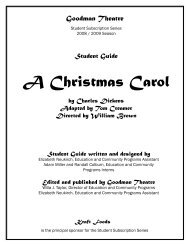El Nogalar Study Guide (9MB) - Goodman Theatre
El Nogalar Study Guide (9MB) - Goodman Theatre
El Nogalar Study Guide (9MB) - Goodman Theatre
Create successful ePaper yourself
Turn your PDF publications into a flip-book with our unique Google optimized e-Paper software.
It is not desirable to cultivate a respect for the law so<br />
much as for the right. … Law never made men a whit<br />
more just; and, by means of their respect for it, even the<br />
well-disposed are daily made the agents of injustice. A<br />
common and natural result of an undue respect for law is,<br />
that you may see a file of soldiers… marching in admirable<br />
order over hill and dale to the wars, against their wills,<br />
ay, against their common sense and consciences, which<br />
makes it very steep marching indeed, and produces a<br />
palpitation of the heart.<br />
His friend and fellow writer Ralph Waldo Emerson<br />
agreed, but thought it futile to protest. When Emerson<br />
visited Thoreau in jail and asked, “What are you doing in<br />
there?” it was reported that Thoreau replied, “What are<br />
you doing out there?”<br />
The churches, for the most part, were either<br />
outspokenly for the war or timidly silent. The Rev.<br />
Theodore Parker, a Unitarian minister in Boston,<br />
combined eloquent criticism of the war with contempt<br />
for the Mexican people, whom he called “a wretched<br />
people; wretched in their origin, history and character,”<br />
who must eventually give way as the Indians did. Yes,<br />
the United States should expand, he said, but not by<br />
war, rather by power of her ideas, the pressure of her<br />
commerce, by “the steady advance of a superior race,<br />
with superior ideas and a better civilization.”<br />
The racism of Parker was widespread.<br />
Congressman Delano of Ohio, an antislavery Whig,<br />
opposed the war because he was afraid of Americans<br />
mingling with an inferior people who “embrace all<br />
shades of color… a sad compound of Spanish, English,<br />
Indian, and negro bloods… and resulting, it is said, in the<br />
production of a slothful, ignorant race of beings.”<br />
As the war went on, opposition grew. The<br />
American Peace society printed a newspaper, the<br />
Advocate of Peace, which published poems, speeches,<br />
petitions, sermons against the war, and eyewitness<br />
accounts of the degradation of army life and the horrors<br />
of battle. Considering the strenuous efforts of the<br />
nation’s leaders to build patriotic support, the amount<br />
of open dissent and criticism was remarkable. Antiwar<br />
meetings took place in spite of attacks by patriotic mobs.<br />
As the army moved closer to Mexico City, the<br />
antislavery newspaper The Liberator daringly declared its<br />
wishes for the defeat of the American forces: “Every lover<br />
Issue No.1 of The Liberator. Photo courtsey of the Library Company of<br />
Philadelphia.<br />
of Freedom and humanity, throughout the world, must<br />
wish them [the Mexicans] the most triumphant success.”<br />
Frederick Douglass, a former slave and an<br />
extraordinary speaker and writer, wrote in his Rochester<br />
newspaper, the North Star, Jan. 21, 1848, of “the<br />
present disgraceful, cruel, and iniquitous war with our<br />
sister republic. Mexico seems a doomed victim to Anglo<br />
Saxon cupidity and love of dominion.” Douglass was<br />
scornful of the unwillingness of opponents of the war to<br />
take real action (even the abolitionists kept paying their<br />
taxes):<br />
No politician of any considerable distinction or eminence<br />
seems willing to hazard his popularity with his party… by<br />
an open and unqualified disapprobation of the war. None<br />
seem willing to take their stand for peace at all risks; and<br />
all seem willing that the war should be carried on, in some<br />
form or other.<br />
Where was popular opinion? It is hard to say.<br />
After the first rush, enlistments began to dwindle.<br />
Historians of the Mexican war have talked easily about<br />
“the people” and “public opinion.” Their evidence,<br />
however, is not from “the people” but from newspapers,<br />
claiming to be the voice of the people. The New York<br />
Herald wrote in August 1845: “The multitude cry aloud<br />
for war.” The New York Morning News said “young and<br />
16<br />
<strong>El</strong><strong>Nogalar</strong>.indd 16<br />
3/25/2011 4:05:38 PM


